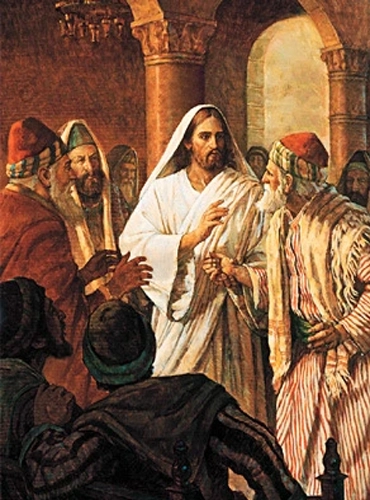Saturday of the Thirty-first Week in Ordinary Time – Lk 16:9-15
Today’s Gospel continues the difficult passage that we heard yesterday. Yesterday we heard the parable of the dishonest steward, and today’s Gospel begins with the difficult phrase: “Make friends for yourselves with dishonest wealth, so that when it fails, you will be welcomed into eternal dwellings.” Let us consider what this phrase means, and then how we can apply it to our lives.
There are two words or phrases that require some explanation: first, in English, the meaning of what Jesus says isn’t obvious, whereas in Greek it is straightforward. “Make friends for yourselves with dishonest wealth” could either mean “become friends with dishonest wealth,” or “use dishonest wealth to make friends.” In Greek, it is the second meaning that Jesus uses: dishonest wealth should be used as a tool or an instrument in order to make friends. The second phrase is “dishonest wealth.” The Greek literally reads “mammon of unrighteousness or iniquity.” Here, too, the implication is that something is wrong with mammon in itself, and not that it is simply acquired dishonestly.
With these two clarifications in mind, what is Jesus telling us about our lives? Saint Augustine says that when Jesus speaks of the mammon of unrighteousness, He means to say that these things, be they money, gold, or any worth of riches, are only really valuable to the unrighteous. Even if a Catholic or believer in general has money, they don’t set their heart on them; their riches lie elsewhere, namely, in heaven. If we find ourselves placing our hopes in money, then that is where our heart lies, and we are serving a poor master who will not be able to pay us back eternally. Money should be used in order to help the poor and others in need; that way, we will truly have treasure in heaven.
Jesus then offers two further analogies to help us understand the situation: He compares us to trustworthy or dishonest stewards, and reminds us that slaves cannot serve two masters.
Commenting on this, one scholar writes that the rule of being trustworthy in small things and therefore in big matters “is clearly true of earthly things. No man will be advanced to higher office until he has given proof of his honesty and ability in a smaller position. But Jesus extends the principle to eternity. He says, ‘Upon earth you are in charge of things which are not really yours. You cannot take them with you when you die. They are only lent to you. You are only a steward over them. They cannot, in the nature of things, be permanently yours. On the other hand, in heaven you will get what is really and eternally yours. And what you get in heaven depends on how you use the things of earth. What you will be given as your very own will depend on how you use the things of which you are only steward.’”
Likewise, the same scholar notes that no slave can serve two masters, and this because “the master possessed the slave, and possessed him exclusively. [Whereas a free man might have free time to work multiple jobs] a slave had no spare time; every moment of his day, and every ounce of his energy, belonged to his master. He had no time which was his own. So, serving God can never be a part-time or a spare-time job. Once a man chooses to serve God every moment of his time and every atom of his energy belongs to God. God is the most exclusive of masters. We either belong to him totally or not at all.”
We can ask ourselves: what is the wealth we possess in our lives? How are we making use of it? Through the intercession of Mary, Queen of Heaven, let us ask for the grace to use all that we have received in order to get to heaven.





